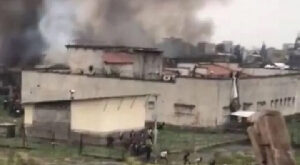President Cyril Ramaphosa will make “serious decisions” about the lockdown after considering all options based on scientific modelling and advice as well as the possible economic repercussions of the nationwide shutdown.
Jackson Mthembu, the minister in the presidency, told News24 Ramaphosa had not yet taken a decision whether the current lockdown would be extended or whether a second lockdown was being considered.
There have been no proposals tabled at the National Command Council which was the government body chaired by Ramaphosa tasked with managing South Africa’s response to the coronavirus, he said.
Three health experts say any premature suspension of the lockdown will lead to an increase in the rate of infections, which seemingly have started to slow down.
President Cyril Ramaphosa says the government will assess the effectiveness of the 21-day lockdown, which is due to end on 16 April, in the coming days.
Economists, however, are warning a prolonged lockdown may cause irreparable harm to the economy, with Finance Minister Tito Mboweni set to hold a press conference on Thursday to address recent economic developments, which include another ratings downgrade.
Covid19 fast facts
– Number of confirmed infections: 1 845
– Number of tests: 63 776
– Number of recoveries: 45
– Number of confirmed deaths: 18
According to Mthembu, the president would look to consult with various sectors and stakeholders before making a decision as he did before he announced the lockdown almost three weeks ago.
“First, we must make a proper assessment if we have achieved all of our objectives, which was to a greater degree to flatten the infection curve and ensure it doesn’t peak. What we’ll have to review is whether we’ve achieved that,” he said, adding the National Institute of Communicable Diseases (NICD) and the Department of Health were leading this assessment.
“The issue of the [lockdown] extension has not yet arisen. If it comes, there will be serious decisions to be made. The National Command Council discusses all recommendations that come before it, and there must be scientific evidence supporting any recommendation from the national joint operational and intelligence structure,” Mthembu said.
Ramaphosa will consult again
Various stakeholders, both inside and outside the government, are currently preparing models attempting to predict the rate of infection as well as to determine whether the current lockdown has been successful. These models, including those being developed outside of the government, will be presented to the National Command Centre.
The economic implications of the lockdown, as well as a possible second lockdown, is being debated at the highest levels of the state, with officials and ministers looking at ways to kick-start the economy as soon as possible.
The SA Reserve Bank expects GDP to contract by between 2 and 4% after the lockdown.
A senior academic, who is part of one of several groups working on the modelling and projection of the Covid-19 outbreak, said the rate of new infections had now reached a linear trajectory, seemingly showing the lockdown was working.
He did not wish to be quoted as he is not authorised to speak to the media.
Compared with in the rate in mid-late March when the increase in infection rates was “exponential”, infection rates have slowed significantly.
But this was a snapshot in time and did not factor in the lifting of the lockdown or certain conditions of it, he said. If the lockdown was to be lifted, the rate of infections would again increase drastically.
Another epidemiologist, who is also involved in efforts to provide information to the government and also not authorised to speak to the media, said the peak infection rate would only be reached in a few months and emphasised that testing efforts, described as currently inadequate, would need to be ramped up significantly.
Limiting transmissions
Dr Kerrin Begg, a public health specialist at the University of Stellenbosch, said from a public health point of view, the best way to limit community transmissions was to limit movement dramatically.
The flattened peak of infections being observed now was mostly based on imported cases, she said.
“It is likely that our big curve of the epidemic is only starting now. So, returning to a fully operational society has significant risk in that as you expose people to each other, cases could really increase,” added Begg.
Another concern was experts were realising the asymptomatic spread of the disease had been higher than initially thought – the lockdown helped to minimise this, she said.
There were other ways to minimise gathering outside of a full-blown lockdown, Begg added, including deferring the opening of schools and universities, limiting the number of people allowed to gather to much lower than 100, and continuing to encourage hand washing and other hygiene practices.
The government could also consider other options relating to densely populated areas, such as restricting movement to not just the home, but a smaller area or block, which would still limit the spread of the disease.
“We know from other pandemics that any restriction of movement helps … while it is difficult, restricting movement is the most effective way to limit the spread of the disease.”
NEWS24
 Home Of Ghana News Ghana News, Entertainment And More
Home Of Ghana News Ghana News, Entertainment And More





